- What Are Legal Mobile Apps?
- 5 Reasons Your Law Firm Needs An App
- 9 Common Types Of Legal Apps
- Is It Worth Investing In Legal Apps?
- Must-Have Features Of Legal Apps For Clients And Law Firms
- Development Steps For Next-Generation Mobile Apps For Law Firms
- Tech Stack For The Development Of Law Firm App
- The Do’s And Don’ts Of Law Firm App Development
- How Much Does It Cost To Develop Legal Apps For Lawyers?
- Top 5 Legal Apps In Market In 2023
- Conclusion
- FAQ
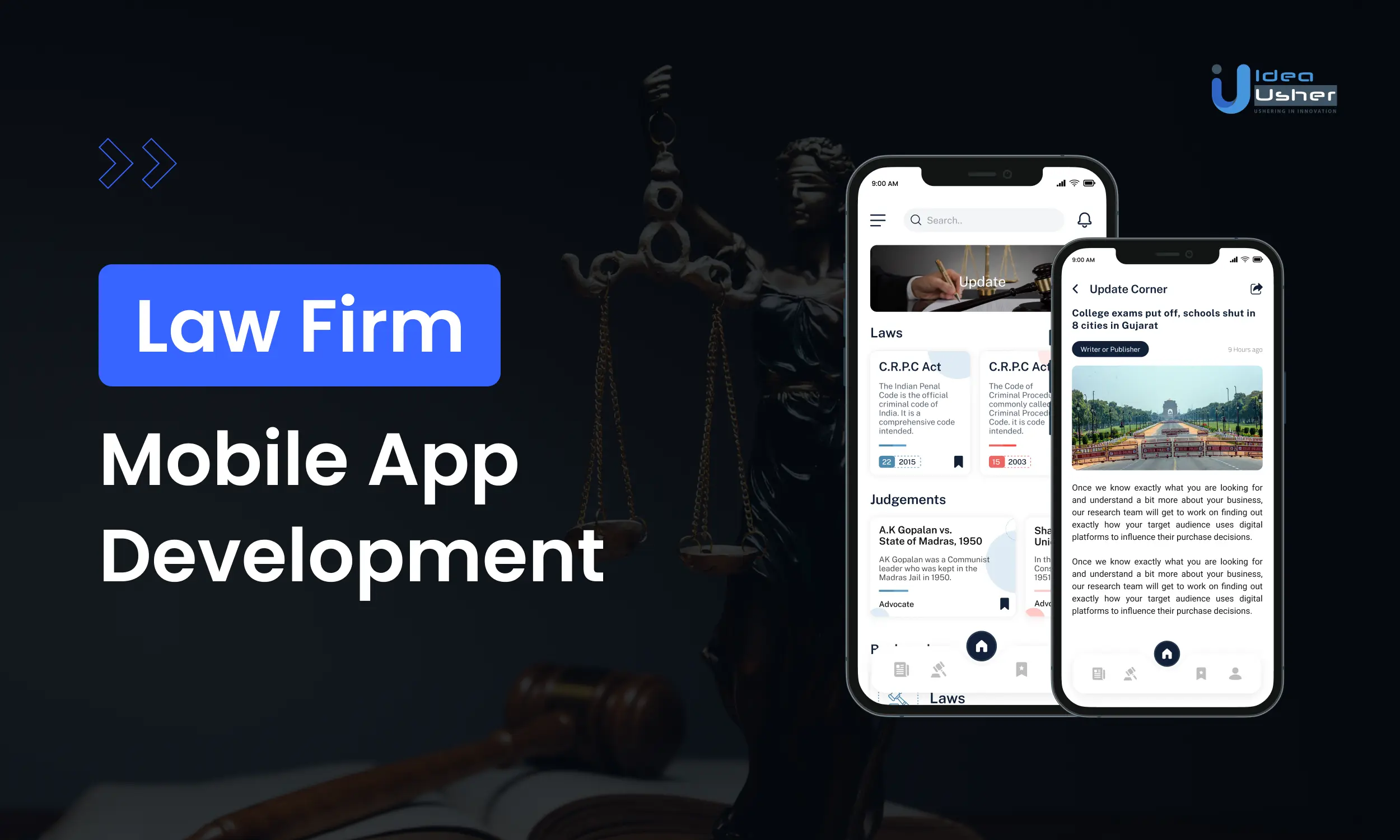
How can the development of a dedicated mobile app revolutionize the operations of a law firm and fundamentally reshape its functioning? Technology serves as a critical catalyst in driving transformative changes across diverse industries, and the legal sector is no exception.
Undoubtedly, technological advancements have streamlined the communication channels between attorneys and clients, bolstered accessibility to research findings, facilitated the seamless process of electronic filing, and much more. Yet, to truly harness the advantages of technology, law firms, irrespective of their scale, must make prudent investments in appropriate enterprise mobility solutions.
The global legal case management software market size was valued at USD 0.776 billion in 2020 and is projected to reach USD 1.91 billion by 2028; it is expected to grow at a CAGR of 12.4% during 2021–2028. The global legal case management software market growth is influenced by increasing technology integration in legal case management solutions, commercialization of 5G technology, and the growing trend of paperless procedures in law firms.
In this blog, we will explore the immense potential of developing an app for your law firm, catering specifically to entrepreneurs and individuals associated with legal practices. Discover how this technological innovation can elevate your firm’s efficiency, client satisfaction, and, ultimately, your bottom line!
- What Are Legal Mobile Apps?
- 5 Reasons Your Law Firm Needs An App
- 9 Common Types Of Legal Apps
- Is It Worth Investing In Legal Apps?
- Must-Have Features Of Legal Apps For Clients And Law Firms
- Development Steps For Next-Generation Mobile Apps For Law Firms
- Tech Stack For The Development Of Law Firm App
- The Do’s And Don’ts Of Law Firm App Development
- How Much Does It Cost To Develop Legal Apps For Lawyers?
- Top 5 Legal Apps In Market In 2023
- Conclusion
- FAQ
What Are Legal Mobile Apps?
Legal mobile applications have become indispensable tools that revolutionize workflow, productivity, organization, and remote communication of law firms. These all-in-one solutions go beyond basic tasks like invoicing and time tracking, offering tailored features for law firms of all sizes.
By leveraging these apps, firms can streamline internal processes, generate referrals, boost client loyalty, stay technologically advanced, and stand out from competitors. With intuitive interfaces, these apps enable efficient management of billable hours, client information, case documents, and secure remote communication. They also facilitate financial tracking, project management, and collaboration.These apps enhance client satisfaction, increase recommendations, and demonstrate commitment to innovation by providing personalized client portals, document sharing, and real-time communication channels.
Embracing legal mobile apps places firms at the forefront of technology, attracting tech-savvy clients and ensuring success in a competitive landscape. Incorporating these tools optimizes operations, enhances client relationships, and drives growth in the digital age.
5 Reasons Your Law Firm Needs An App
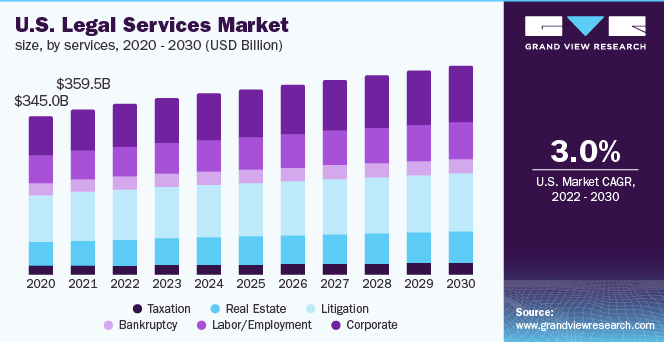
1. Statistics related to law firms and online marketing
- 65% of law firms allocate a majority of their marketing budget to online channels (Source: Martindale Nolo).
- This highlights the effectiveness and importance of Internet marketing strategies in the legal landscape.
2. Significance of buying web leads in marketing
- 49% of law firms consider buying web leads as their best marketing channel (Source: ABA).
- This underscores the role of online marketing in the growth of law practices.
3. Timely response to potential clients
- On average, law firms take 3+ days to respond to messages from new potential clients in 42% of cases (Source: Law Technology Today).
- This emphasizes the need for prompt and efficient follow-up processes to avoid losing prospective clients.
4. Importance of lead tracking
- 26% of law firms do not track their leads at all (Source: Martindale Nolo).
- Utilizing a customer relationship management (CRM) system is crucial for effective lead management and nurturing.
5. Collecting comprehensive contact details
- In 86% of cases, law firms fail to collect email addresses, and in 45% of cases, they fail to collect phone numbers during initial client interactions (Source: Law Technology Today).
- This highlights the significance of gathering comprehensive contact information for effective communication and building trust.
9 Common Types Of Legal Apps
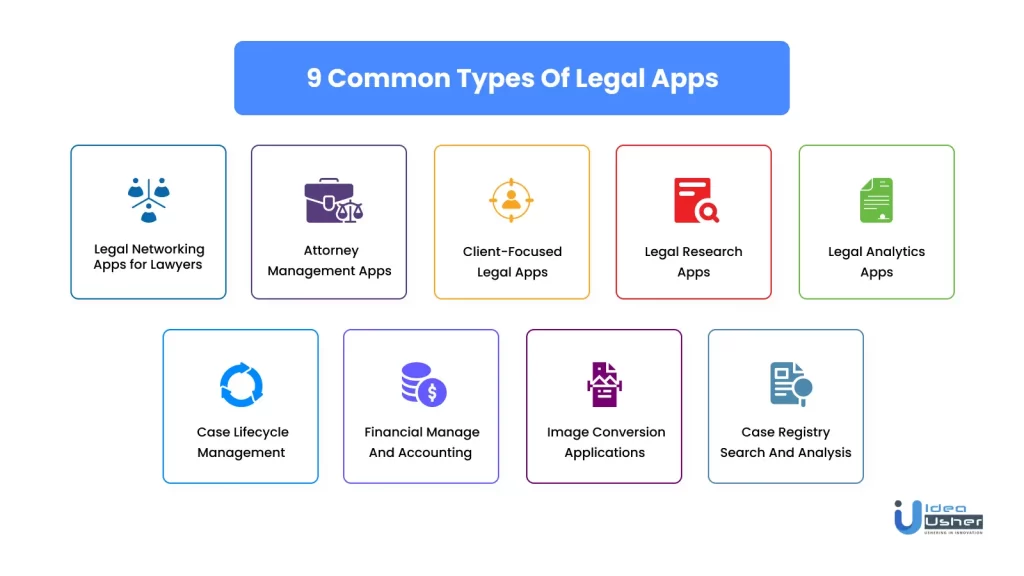
Law firms can leverage various applications to streamline their operations and enhance efficiency. These apps cater to different aspects of legal practice and management and offer comprehensive functionalities for contract management, document organization, task tracking, and time management. Here is a list of some common types of legal firm apps, some with their sub-categories:
1. Legal Networking Apps For Lawyers
- These applications foster professional connections and collaboration among lawyers.
- They offer a range of functionalities, including scheduling meetings, facilitating real-time communication through chats, enabling seamless document sharing, and efficient management of billing and invoices.
- These apps serve as a platform for lawyers to expand their network and enhance their professional relationships.
2. Attorney Management Apps
- Designed specifically for attorneys, these apps streamline various aspects of their work.
- They provide robust features to easily handle contracts, paperwork, and tasks, ensuring efficient organization and management.
- These apps simplify appointment scheduling, enabling attorneys to effectively manage their calendars and allocate time for client meetings.
- They also help maintain strong client connections by offering tools for timely communication and updates.
- With built-in time tracking capabilities, attorneys can accurately monitor and record billable hours, enhancing productivity and ensuring accurate invoicing.
3. Client-Focused Legal Apps
- These apps cater to the needs and preferences of clients, enhancing their experience with legal services.
- Clients can easily search for law firms and attorneys through user-friendly interfaces, ensuring a seamless connection with legal professionals.
- The apps enable convenient appointment scheduling, allowing clients to choose a suitable time slot and receive confirmation.
- Clients can view and track their activity and payment invoices in one centralized location, ensuring transparency and easy access to important information.
- These apps provide features like meeting reminders, ensuring clients stay organized and never miss important appointments.
- Secure document-sharing capabilities allow clients to conveniently send and receive documents, ensuring smooth communication and collaboration.
- The ability to digitally sign contracts within the app streamlines the process and saves time for both clients and legal professionals.
4. Legal Research Apps
- Legal database apps: These apps provide access to vast repositories of legal materials, including case law, statutes, regulations, and legal opinions, allowing legal professionals to conduct thorough research and stay updated on legal developments.
- Citator apps: Citator apps help legal practitioners verify the current validity and authority of legal citations, ensuring the accuracy and relevance of legal research.
5. Legal Analytics Apps
- Data analytics apps: These apps leverage data analytics and visualization techniques to extract insights from legal data, helping law firms make informed decisions, identify patterns, and improve performance.
- Predictive analytics apps: By utilizing machine learning algorithms, these apps analyze historical legal data to predict case outcomes, assess risks, and provide strategic guidance to legal professionals.
6. Case Lifecycle Management
- These apps allow law firms to create tailored workflows for different types of cases, ensuring efficient progression and organization.
- They keep a record of all case-related notes and updates, enabling easy reference and maintaining a chronological overview.
- It can be used to set reminders for important deadlines, hearings, and appointments, ensuring timely actions and avoiding missed opportunities.
- Users can organize files, emails, voice notes, and template files associated with each case, providing quick access to relevant information.
- These apps facilitate seamless communication with clients through integrated communication channels within the app.
- This app can be used to assign tasks to specific team members, promoting collaboration and effective workload distribution.
- Users can share calendars and schedule events within the app, ensuring everyone stays updated on important dates.
7. Financial Management And Accounting
- These apps can be used to generate accurate invoices and bills for legal services rendered, simplifying the financial management process.
- Access workflows that outline the necessary tasks and events for each case, ensuring nothing falls through the cracks.
- Enable clients to conveniently make payments using integrated credit card processing within the app.
- Automate sales-related tasks and workflows, reducing manual effort and increasing productivity.
- Receive email alerts when clients view their invoices, promoting transparency and timely payment.
- Generate reports to track billable hours per user, aiding in financial analysis and resource allocation.
- These apps can be integrated with popular tools like Dropbox, QuickBooks, PayPal, and others, enhancing convenience and connectivity.
8. Image Conversion Applications
- Utilize mobile apps that enable scanning printed documents or handwritten memos, converting them into digital files.
- Process multiple pages or documents in one go, saving time and effort.
- Automatically crop scanned photos and adjust image quality for better readability.
- Save scanned results to designated folders or case repositories and easily share them via email or other communication channels.
- Print scanned files wirelessly using compatible printers, providing convenience and flexibility.
- Tailor PDF page sizes according to your preferences, ensuring compatibility with different document standards.
9. Case Registry Search And Analysis
- Access an extensive collection of primary law, including case law and statutes, legal blogs, law review articles, briefs, pleadings, and expert witness databases.
- Utilize intelligent algorithms that swiftly identify relevant cases and sections based on search queries, saving valuable time and effort.
- Access supplementary resources such as secondary treatises and analytics to gain deeper insights and support legal research.
- Benefit from streamlined navigation within the app, allowing users to jump directly to specific cases, sections, or related materials.
Is It Worth Investing In Legal Apps?
Considering the growing reliance on technology in the legal profession, investing in legal apps can be a worthwhile decision. These apps offer numerous benefits that can enhance efficiency, productivity, and convenience for lawyers. Here are some reasons why investing in legal apps can be valuable:
Benefits Of Legal Apps For Law Firms
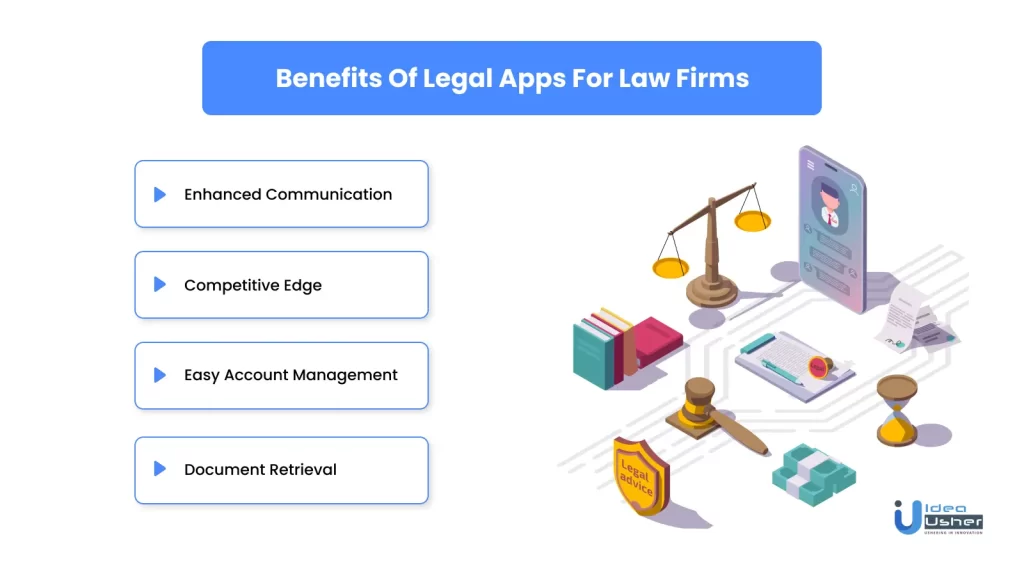
1. Enhanced Communication
- Clients and lawyers can communicate more effectively through mobile apps.
- Tailored apps provide a unique link and engagement, enhancing a law firm’s identity.
2. Competitive Edge
- Mobile apps demonstrate a law firm’s up-to-date technology adoption.
- Customized apps with firm branding display professionalism, differentiating from competitors.
- Shows the firm’s commitment to staying ahead of the curve.
3. Easy Account Management
- Legal apps offer useful tools for efficient business management.
- Features include invoicing, income monitoring, project management, and time tracking.
4. Document Retrieval
- Legal mobile apps store and organize documents digitally for quick and easy retrieval.
- Eliminates the challenges of manual data management techniques.
Benefits Of Legal Apps For Clients
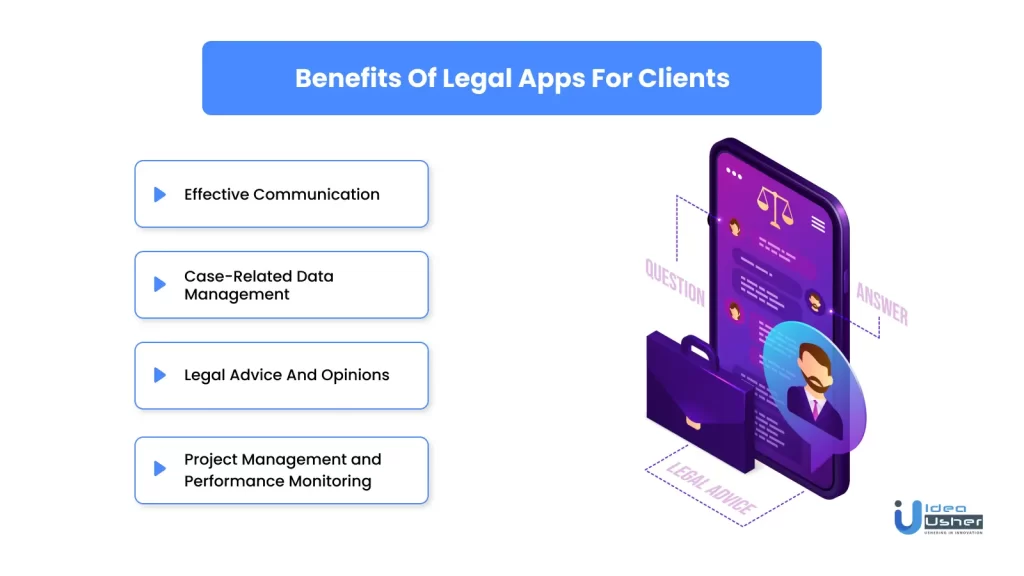
1. Effective Communication
- Instant messaging features enable efficient communication, reducing the need for postage.
- Enables cost savings and timely interactions with clients.
2. Case-Related Data Management
- Clients can arrange and store case-related data, information, and documents within the app.
- Provides a centralized and organized system for easy access.
3. Legal Advice And Opinions
- A well-designed legal app with competent legal content enables communication with users.
- Offers opportunities to provide general legal advice or communicate legal opinions to potential clients and referrals.
4. Project Management And Performance Monitoring
- Legal mobile apps allow project managers to assign and delegate work.
- Enables monitoring of employee performance and progress.
Must-Have Features Of Legal Apps For Clients And Law Firms
There are numerous features that can be incorporated into your custom legal mobile application. However, it is important to consider that the more functionalities included, the higher the cost of legal mobile app development will likely be. Here are some of the feature list for an legal app:
1. Documentation Management
- Document creation with template options and customization capabilities.
- Integration of AI technology for document analysis and modification.
- Simplified document sharing and support for document review and approval, including electronic signatures and enhanced security measures.
- Secure cloud storage with encryption and two-factor authentication.
- Utilization of blockchain technology for document integrity, authenticity, and version history.
2. Legal Research And Analysis
- AI/NLP functionality for comprehensive legal research.
- Locate and process a large volume of relevant documents.
- Analyze documents related to past cases and find patterns.
- Search for patents, trademarks, and registered products.
3. Client Management
- Client profile with personal data, case history, activity, and contact info.
- Invoice management and display of paid and unpaid invoices.
- Scheduling and contact management functions.
- Integration with calendaring and reminder features.
- Contract management and e-signature functionality.
4. Task Management
- Create tasks and assign them to employees.
- Assignable to-do lists with detailed instructions and priorities.
- Search tasks by multiple criteria.
- Integration with calendaring for task-related information.
5. Expenditure, Billing, Payment And Invoice Management
- Automatic generation of editable invoices.
- Search paid and issued invoices by criteria.
- Easy payment options for clients.
- Separate module for managing expenses, such as stamp duty and court fees.
6. Central Dashboard
- Dynamic dashboard displaying current and forthcoming events.
- Client appointments, court deadlines, tasks, and outstanding bills overview.
7. CRM Integration
- Manage client relationships and communications effectively.
- Provide instant assistance through call and chat support.
8. Cloud Storage Integration
- Ensure secure and private storage of user data.
- Utilize a reliable cloud storage system for enhanced security.
9. GPS Integration
- Help users easily locate nearby law firms.
- Collaborate with mobile app developers to integrate GPS functionality.
10. Voice-to-Text Transcription And In-App Video Chat
- Convert voice messages into text format for easy sharing.
- Provide users with the convenience of sharing spoken messages as text.
- Enable lawyers, agencies, and users to engage in video communication.
- Enhance collaboration and convenience through the in-app video chat feature.
Apart from the aforementioned features, here are some potential and basic features that can be integrated into your legal mobile app:
| Law Firm Panel Features | Lawyer Panel Features | Client Panel Features | Super Admin Panel Features |
| User Authentication (Login/Register) | User Authentication (Login) | Registration/Login | User Authentication (Login) |
| Verification process for genuine customers | Attorneys receive notifications with client information | Search for law firms | Dashboard offering overall statistics |
| List of services offered by attorneys | Lawyers can create and manage notes and documents | Book Appointments | Managing firms & user profile |
| Efficient management of bookings and documents | Task management for handling cases | Send documents & sign contract | Subscription Plan, add new plans & manage them |
| Expense calculation for each case | Collaboration with clients during case handling | Manage & view cases | Online support to help others |
| Bulk information sharing with clients and employees | Seamless messaging between attorneys, lawyers, and employees | Reminders for meetings | Content Management System to manage system content, both in text & image form |
| Push notifications for client updates | Email and push notification updates | Managing profile & online support | Push Notifications & refer the app to friends |
| Expense tracking for law firm records | Referrals and discounts management | Activity & payment invoice | – |
| Profile management for lawyers | Comprehensive dashboard displaying activities, reminders, and meetings | – | – |
| Contract signing with electronic signature | Subscription and panel access management | – | – |
| Real-time reporting and analytics | Invoice management | – | – |
| Case duration calculator | Streamlined workflow | – | – |
Development Steps For Next-Generation Mobile Apps For Law Firms
Elevate your law firm’s digital presence by following these indispensable steps to build a remarkable legal mobile app for your firm.
1. The Research And Analysis Phase
It is a crucial phase in the development of a law firm app. Whether you’re building an app for case management, document organization, or client communication, it’s essential to understand the specific needs and challenges faced by law firms. During the planning stage, it is important to ask targeted questions to gather the necessary information:
- Problem Identification: What problems or pain points do law firms typically encounter in their day-to-day operations? How can the app address these challenges and provide valuable solutions?
- Target Users: Who will be the primary users of the app within the law firm? Is it attorneys, paralegals, or support staff? Understanding their roles and responsibilities will help tailor the app’s functionalities to their specific needs.
- Data Input and Output: What types of data will the app need to handle? This could include case details, client information, legal documents, deadlines, and other relevant data. Additionally, what output formats or reports are required to facilitate decision-making and analysis?
- Security and Privacy: Law firms deal with sensitive and confidential information. What measures will be implemented to ensure data security and privacy? Consider encryption, access controls, secure authentication, and compliance with legal regulations such as attorney-client privilege and data protection laws.
By addressing these questions and thoroughly understanding the requirements, you can develop a law firm app that streamlines workflows, enhances collaboration, improves efficiency, and provides a secure platform for legal professionals to manage their cases effectively. This lays the foundation for creating a tailored product design that meets the unique needs of the law firm and its legal professionals.
2. The Design Phase
Once the requirements have been established, it is time to focus on the product design phase. This involves envisioning the app’s appearance and functionality. Depending on the chosen software development approach, you may create simple wireframes that illustrate how various components and connections will operate within the app, or you may utilize specialized tools to develop more comprehensive prototypes.
During the product design process, special attention is given to the User Interface (UI) and User Experience (UX).
- The UI is designed to be user-friendly, modern, and visually appealing, taking into account the intended audience of the law firm app and its primary functions.
- The goal is to create an intuitive and seamless interface that facilitates efficient usage for legal professionals.
The product design layouts serve as a crucial foundation for the subsequent stages of development and it involves the following key points:
- Visualizing App Appearance: Once the requirements are established, it’s important to envision how the application will look and function.
- Wireframes or Prototypes: Depending on the chosen software development approach, create simple wireframes or utilize tools to develop comprehensive prototypes.
- User Interface (UI) and User Experience (UX): Design a user-friendly that aligns with the specific requirements of the law firm and its legal professionals. This will basically serve as a crucial foundation for implementing the desired features and functionalities within the app.
- Intuitive Interface: Prioritize an intuitive and seamless UX/UI, so the law firm app can deliver a positive user experience, streamline workflows, and enhance overall productivity within the legal practice.
3. The MVP Phase
When developing a law firm app, it is essential to ensure that your application concept is not only inspiring but also practical and capable of meeting current market demands. To provide value to your business, the final product should be nearly flawless. This is where the Minimum Viable Product (MVP) approach plays a significant role.
The MVP version of the app can focus on incorporating essential functions for law firms, such as providing firm information, note-taking capabilities, and document scanning features. This is important as it offers several benefits. It enables you to:
- Validate the concept: By launching an MVP, you can assess the market response and gather feedback from users, ensuring your app aligns with their needs.
- Minimize risks: Developing a full-featured app without testing its viability can be risky. MVP development reduces risks by identifying and rectifying issues early on.
- Optimize resource allocation: With an MVP, you can prioritize the core features and allocate resources effectively, maximizing cost efficiency.
- Iterative improvement: Feedback collected from the MVP allows you to make data-driven decisions for enhancing the app’s performance, usability, and functionality over time.
4. The Development Phase
This particular phase can be recognized as the most demanding and high-risk stage in the Software Development Life Cycle (SDLC). To mitigate these risks and ensure the successful development of robust and efficient applications, there are key strategies and collaborations to consider:
- Agile development methodology: Embracing Agile principles and working in iterative sprints allows for greater flexibility and adaptability throughout the development process. This approach enables continuous feedback, rapid prototyping, and timely adjustments based on evolving requirements.
- Collaboration with expert mobile app developers: Partnering with a reputable mobile app development company specializing in law firm apps is instrumental in navigating the complexities of legal requirements and industry-specific functionalities. Their expertise ensures adherence to best practices, regulatory compliance, and the delivery of clean, secure, and efficient applications.
During this phase, it is crucial to prioritize key considerations to ensure that your app for a law firm meets the necessary legal requirements and provides a secure and scalable final product. Here are the essential points to focus on:
- Security and data privacy: Implement robust security measures to protect sensitive data. Comply with legal and industry standards, such as encryption, secure user authentication, and data protection protocols, to safeguard client information and maintain confidentiality.
- Compliance with legal regulations: Ensure that the app adheres to relevant legal regulations, such as data protection laws (e.g., GDPR, HIPAA) and professional code of ethics for lawyers. Stay updated on any changes in legislation that may impact the app’s functionality or data handling.
- Scalability and performance: Design the app with scalability in mind to accommodate potential future growth and increasing user demands. Optimize performance through efficient coding practices, database design, and leveraging caching and optimization techniques.
5. The Testing Phase
Throughout the software development process, it is essential to continuously assess, track, and address any issues that arise. However, comprehensive testing becomes imperative once the core functionalities are integrated, and the app is nearing completion. This can involve engaging a select group of beta testers or employing user experience tools to observe user interactions and gather feedback.
By conducting extensive testing, you can ensure that the app meets the specific requirements of a law firm and delivers an optimal user experience. This iterative approach enables refinement and enhancement before the app is deployed, resulting in a reliable and user-friendly solution tailored to the needs of legal professionals.
Tech Stack For The Development Of Law Firm App
| Purpose | Technology |
| Programming Languages | Java, Swift, Kotlin |
| Mobile App Frameworks | React Native, Flutter |
| Backend Development | Node.js, Ruby on Rails, Django |
| Database | PostgreSQL, MySQL, MongoDB |
| Cloud Storage | Amazon S3, Google Cloud Storage |
| Authentication | OAuth, JWT |
| Communication | WebRTC, Socket.IO |
| API Integration | RESTful API, GraphQL |
| Push Notifications | Firebase Cloud Messaging, Apple Push Notification Service |
| Data Security | Encryption, SSL/TLS |
| Analytics | Google Analytics, Mixpanel |
| Payment Gateway | Stripe, PayPal |
| DevOps Tools | Git, Jenkins, Docker, Kubernetes |
The Do’s And Don’ts Of Law Firm App Development
It is essential to consider several key factors while developing an app for a law firm to ensure success and avoid common pitfalls. Here are the do’s and don’ts to keep in mind during the development process:
DO:
- Understand the purpose: Clearly define the need your app will address and how it will add value to your firm or clients. Avoid developing an app solely because it’s a trend.
- Prioritize the client experience: Focus on creating a user-friendly app that caters to your client’s needs and enhances their experience with your firm.
- Seek client input: Involve clients in the development process by gathering their feedback and insights. This collaboration can lead to a more tailored and valuable app.
- Embrace open innovation: Adopt an open mindset and collaborate with others, including external developers and clients, to foster innovation and gather diverse perspectives.
DON’T:
- Neglect the app production process: Pay attention to the development process and ensure it is well-managed. Consider factors like speed to market, flexibility to adapt, effective communication among stakeholders, and openness to suggestions.
- Overlook thorough testing: Conduct extensive testing to ensure a delightful user experience. Test the app’s functionality, usability, and performance to identify and address any issues or shortcomings.
- Disregard the importance of continuous improvement: Embrace a mindset of continuous improvement and iterate based on user feedback. Stay responsive to evolving needs and make necessary adjustments to enhance the app’s value over time.
- Ignore industry collaboration: Embrace collaboration with other legal tech companies and industry peers. By interfacing with others and staying aware of advancements, you can contribute to a more integrated and efficient legal ecosystem.
As the legal industry continues to leverage app technology, keeping these do’s and don’ts in mind will help guide your law firm app development efforts and deliver innovative solutions that elevate your firm’s operations and client services.
How Much Does It Cost To Develop Legal Apps For Lawyers?
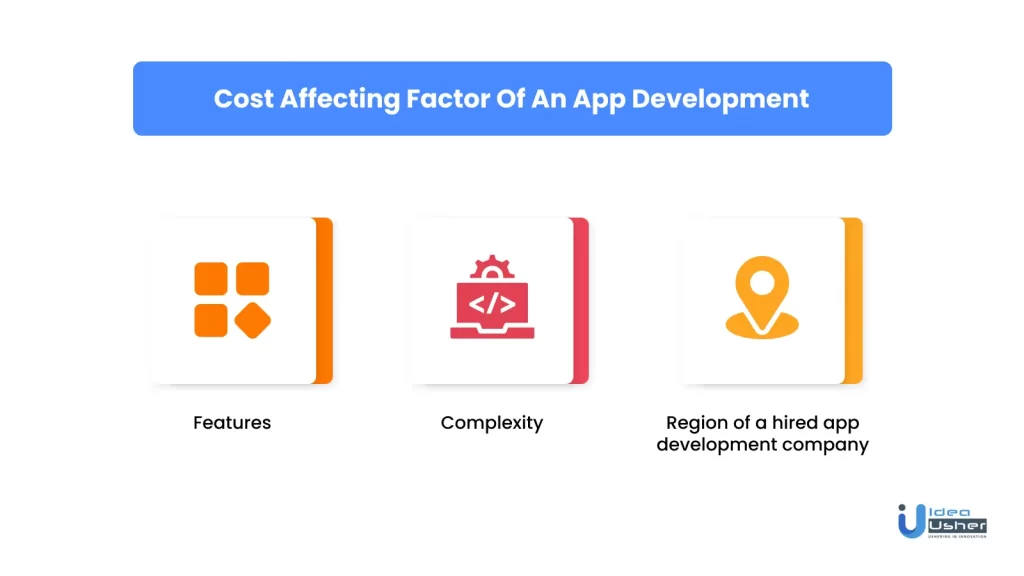
Determining the cost of developing legal apps for lawyers is influenced by various factors and requirements. These factors include the desired features, the level of complexity involved, and the geographical location of the app development company chosen.
The total cost of developing a comprehensive lawyer mobile app is contingent upon the number of features incorporated, the mobile platforms targeted, and the developer’s hourly rate, which varies based on the country.
If you require assistance in estimating the cost of your project, the experienced professionals at Idea Usher can provide you with a detailed quotation tailored to your specific needs.
Top 5 Legal Apps In Market In 2023
1. Fastcase
- Fastcase is a lawyer app that allows users to access a comprehensive collection of laws and cases on the go.
- Features: American Law Library; cases and statutes of 50 American states; browse and search feature.
2. Off The Record
- Off The Record is a top app for finding lawyers. Users can upload details of their cases and receive offers from competing lawyers for immediate legal help.
- Features: Upload the ticket from your phone, get offers from the best lawyers, lawyers from every state.
3. Clio
- Clio is a work management app designed to streamline legal work processes. It offers features like trackable work, document sharing, and client communication.
- Features: Online legal help, free to use, connect with clients remotely.
4. Rocket Lawyer
- Rocket Lawyer is an app that assists with legal documentation, insurance, and disaster recovery. It provides quick solutions and allows secure document sharing.
- Features: Sign-in, scan and secure documents, legal help for new businesses, share documents safely.
5. Legal Dictionary
- Legal Dictionary is an app that simplifies legal terms and definitions. Users can search for specific terms, access in-depth explanations, and save information.
- Features: Houses approx 15000 legal definitions, in-depth explanations of legal terms, guide on US law.
Conclusion
The legal industry has embraced the transformative potential of app technology to optimize efficiency, streamline processes, and deliver exceptional client experiences. Notably, apps like Fastcase, Off The Record, and Legal Dictionary offer tailored features that cater to the specific needs of lawyers and legal professionals, yielding satisfactory results.
Moreover, by developing a customized app for your law firm, you can further enhance efficiency and streamline your processes to achieve optimal outcomes. To embark on this journey, selecting the right app development company is paramount.
This is where Idea Usher presents a compelling opportunity to elevate your firm’s operations and effectively meet your clients’ needs. By diligently following the key steps outlined in the development process—requirements gathering, product design, MVP construction, development, and rigorous testing—you can ensure the creation of a robust and user-friendly legal mobile app. Leveraging Idea Usher’s expertise in mobile app development and commitment to industry best practices, you can surmount challenges and mitigate risks throughout the entire process.
Embrace the potential of technology and forge a collaborative partnership with Idea Usher to materialize your law firm app vision. Empower your firm to thrive in the digital age and seize the boundless opportunities that lie ahead. Contact us today!
Contact Idea Usher at [email protected]
Or reach out at: (+1)732 962 4560, (+91)859 140 7140
FAQ
Q. What are the key factors to consider when developing a mobile app for a law firm?
A. Developing a mobile app for a law firm involves considering several crucial factors, such as identifying the specific needs of the firm and its clients, ensuring data security and privacy, integrating essential features like document management and communication, and selecting a reputable app development company with expertise in the legal industry.
Q. How long does it typically take to develop a mobile app for a law firm?
A. The development timeline for a mobile app for a law firm varies depending on various factors, including the complexity of the app, desired features, and the app development process followed. Generally, it can take several weeks to a few months to develop a fully functional and polished app.
Q. What features should be included in a law firm mobile app?
A. A law firm mobile app should include features like client login and registration, case management, document sharing and storage, secure communication channels, appointment scheduling, legal research tools, invoicing and payment options, and integration with legal databases or services. The specific features can be tailored to the unique requirements of the law firm.
Q. How can a law firm ensure data security in its mobile app?
A. Data security is crucial for a law firm mobile app. To ensure data protection, the app should incorporate robust encryption protocols, secure user authentication mechanisms, regular security updates, and compliance with relevant data privacy regulations. Partnering with a reliable app development company with experience in handling sensitive data can further enhance data security.













Rebecca Lal